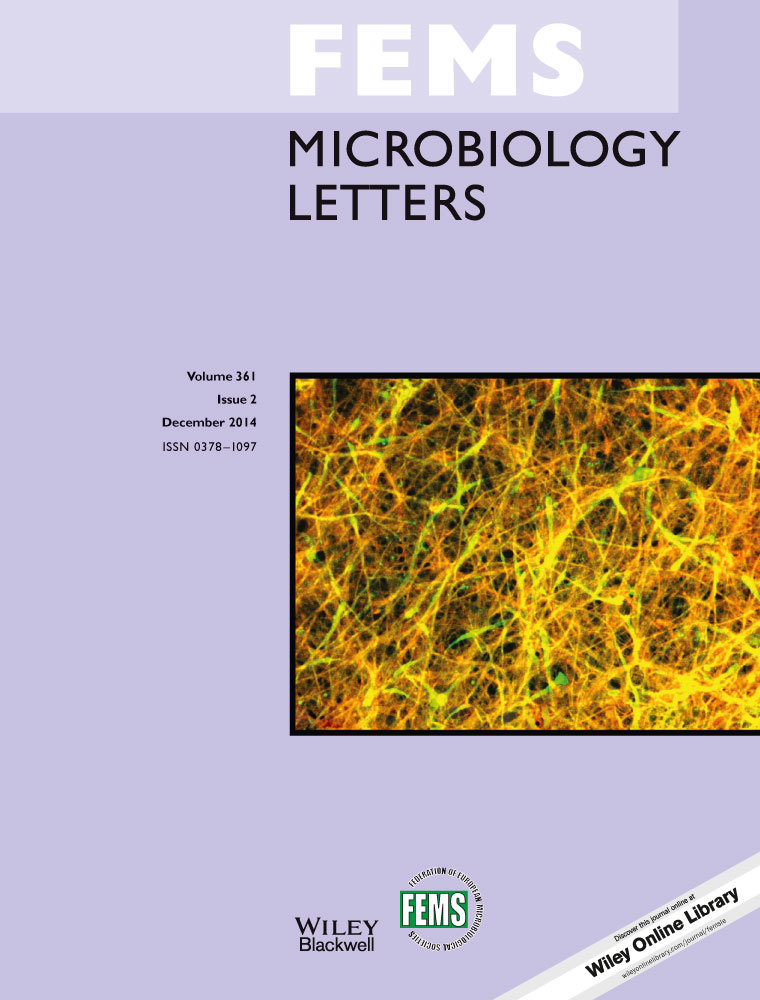Increased thermosensitivity associated with topoisomerase I deletion and promoter mutations in Escherichia coli
Haiyan Qi
Department of Biochemistry and Molecular Biology, Basic Science Building, Room 128, New York Medical College, Valhalla, NY 10595, USA
Search for more papers by this authorRolf Menzel
Small Molecule Therapeutics, 11 Deer Park Drive, Suite 116, Monmouth Junction, NJ 08852, USA
Search for more papers by this authorCorresponding Author
Yuk-Ching Tse-Dinh
Department of Biochemistry and Molecular Biology, Basic Science Building, Room 128, New York Medical College, Valhalla, NY 10595, USA
*Corresponding author. Tel.: +1 (914) 594-4061; Fax: +1 (914) 594-4058, E-mail address: [email protected]Search for more papers by this authorHaiyan Qi
Department of Biochemistry and Molecular Biology, Basic Science Building, Room 128, New York Medical College, Valhalla, NY 10595, USA
Search for more papers by this authorRolf Menzel
Small Molecule Therapeutics, 11 Deer Park Drive, Suite 116, Monmouth Junction, NJ 08852, USA
Search for more papers by this authorCorresponding Author
Yuk-Ching Tse-Dinh
Department of Biochemistry and Molecular Biology, Basic Science Building, Room 128, New York Medical College, Valhalla, NY 10595, USA
*Corresponding author. Tel.: +1 (914) 594-4061; Fax: +1 (914) 594-4058, E-mail address: [email protected]Search for more papers by this authorAbstract
An Escherichia coli mutant with three of the promoters for the topoisomerase I gene (topA) deleted, such that only the σ32-dependent promoter (P1) remained, had a decreased level of topoisomerase I at 30°C and showed increased thermosensitivity at 52°C. However, it could still develop thermotolerance and had a wild-type level of resistance to 52°C treatment if exposed first to 42°C. This indicated that newly synthesized topoisomerase I from transcription initiated at P1 was important for development of thermotolerance. Two other E. coli mutants lacking topA were >100 times more sensitive to high temperature than their wild-type isogenic strains.
References
- [1] Graeme-Cook, K.A., May, G., Bremer, E., Higgins, C.F. (1989) Osmotic regulation of porin expression: a role for DNA supercoiling. Mol. Microbiol. 3, 1287–1294.
- [2] Higgins, C.F., Dorman, C.J., Stirling, L., Waddell, L., Booth, I.R., May, G., Bremer, E. (1988) A physiological role for DNA supercoiling in the osmotic regulation of gene expression in S. typhimurium and E. coli. Cell 52, 569–584.
- [3] Ni Bhriain, N., Dorman, C.J. (1993) Isolation and characterization of a topA mutant of Shigella flexneri. Mol. Microbiol. 7, 351–358.
- [4] Yoshizawa, Y., Yamamoto, N. (1989) Characterization of a nalidixic acid-resistant mutant of Escherichia coli as a strict aerobe. Microbiol. Immunol. 33, 449–457.
- [5] Steck, T., Franco, F., Wang, J., Drlica, K. (1993) Topoisomerase mutations affect the relative abundance of many Escherichia coli proteins. Mol. Microbiol. 10, 473–481.
- [6] Liu, L.F., Wang, J.C. (1987) Supercoiling of the DNA template during RNA transcription. Proc. Natl. Acad. Sci. USA 84, 7024–7027.
- [7] Dorman, C.J. (1996) Flexible response: DNA supercoiling, transcription and bacterial adaptation to environmental stress. Trends Microbiol. 4, 214–216.
- [8] Droffner, M.L., Yamamoto, N. (1991) Prolonged environmental stress via a two step process selects mutants of Escherichia, Salmonella and Pseudomonas that grows at 54°C. Arch. Microbiol. 156, 307–311.
- [9] Droffner, M.L., Yamamoto, N. (1992) Role of nalidixic acid in isolation of Salmonella typhimurium strains capable of growth at 48°C. Curr. Microbiol. 25, 257–260.
- [10] Friedman, S.M., Malik, M., Drlica, K. (1995) DNA supercoiling in a thermotolerant mutant of Escherichia coli. Mol. Gen. Genet. 248, 417–422.
- [11] Leslie, S.A., Jovanovich, S.B., Tse-Dinh, Y.-C., Burgess, R.R. (1990) Identification of a heat shock promoter in the topA gene of Escherichia coli. J. Bacteriol. 172, 6871–6874.
- [12] Qi, H., Menzel, R., Tse-Dinh, Y.-C. (1996) Effect of the deletion of the σ32-dependent promoter (P1) of the Escherichia coli topoisomerase I gene on thermotolerance. Mol. Microbiol. 21, 703–711.
- [13] Qi, H., Menzel, R., Tse-Dinh, Y.-C. (1997) Regulation of Escherichia coli topA gene transcription: Involvement of a σs-dependent promoter. J. Mol. Biol. 267, 481–489.
- [14] Blum, P., Holzschu, D., Kwan, H.S., Riggs, D., Artz, S. (1989) Gene replacement and retrieval with recombinant M13 bacteriophages. J. Bacteriol. 171, 538–546.
- [15] Laemmli, U.K. (1970) Cleavage of structural proteins during the assembly of the head of bacteriophage T4. Nature 227, 680–685.
- [16] Pruss, G.J., Franco, R.J., Chevalier, S.G., Manes, S.H., Drlica, K. (1986) Effects of DNA gyrase inhibitors in Escherichia coli topoisomerase I mutants. J. Bacteriol. 168, 276–282.
- [17] Tse-Dinh, Y.-C. (1998) Bacterial and archeal type I topoisomerases. Biochim. Biophys. Acta 1400, 19–27.
- [18] Mojica, F., Charbonnier, F., Juez, G., Rodriguez-Valera, F., Forterre, P. (1994) Effects of salt and temperature on plasmid topology in the halophilic archaeon Haloerax volcanii. J. Bacteriol. 176, 4968–4973.
- [19] Mizushima, T., Shunji, N., Sekimizu, K. (1993) Relaxation of supercoiled DNA associated with induction of heat shock proteins in Escherichia coli. Mol. Gen. Genet. 238, 1–5.
- [20] Ogata, Y., Mizushima, T., Kataoka, K., Miki, T., Sekimizu, K. (1994) Identification of DNA topoisomerases involved in immediate and transient relaxation induced by heat shock in Escherichia coli. Mol. Gen. Genet. 244, 451–455.
- [21] Linquist, S., Craig, E.A. (1988) The heat shock proteins. Annu. Rev. Genet. 22, 631–677.
- [22] Nagao, R.T., Kimpel, J.A., Key, K.L. (1990) Molecular and cellular biology of the heat shock response. Adv. Genet. 28, 235–274.
- [23] Drolet, M., Bi, X., Liu, L.F. (1994) Hypernegative supercoiling of the DNA template during transcription elongation in vitro. J. Biol. Chem. 269, 2068–2074.
- [24] Drolet, M., Phoenix, P., Menzel, R., Massé, E., Liu, L.F., Crouch, R.J. (1995) Overexpression of RNase H partially complements the growth defect of an Escherichia coli topA mutant: R-loop formation is a major problem in the absence of DNA topoisomerase I. Proc. Natl. Acad. Sci. USA 92, 3526–3530.
- [25] Massé, E., Phoenix, P., Drolet, M. (1997) DNA topoisomerases regulate R-loop formation during transcription of the rrnB operon in Escherichia coli. J. Biol. Chem. 272, 12816–12823.
- [26] Miller, J.H. (1972) Experiments in Molecular Genetics. Cold Spring Harbor Laboratory Press, Cold Spring Harbor, NY.




